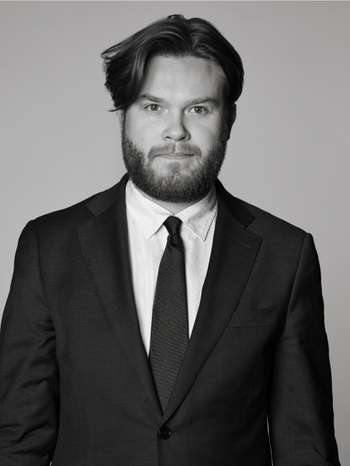Ernst Josephson
"Vår" (Dalarö skans)
Signed Ernst Josephson. Ink on paper 34 x 24.5 cm.
Alkuperä - Provenienssi
Gift from the artist to Galatea Lamm b. Jacobson (1833 - 1913), the artist's aunt.
Purchased by her son Carl Robert Lamm from his mother's death house in 1914, his collection Näsby Slott inventory number 2586 with the title "Kärlekspar i det gröna".
Bukowski Auktioner AB, Stockholm, auction A316, Vårauktionen, 19 - 21 April 1939, cat. no. 623.
Consul Carl Eric Schylter's collection, Kevinge, Stocksund.
Bukowski Auktioner AB,auction 440, Vårauktionen, 2 - 25 April 1986, cat no 253.
Näyttelyt
Gummesons Konstgalleri, Stockholm, "Svensk Naivism", 1949.
Liljevalchs konsthall, Stockholm, "Ernst Josephson - Minnesutställning", 10 February - 11 March 1951, cat no 527, then belonging to Konsul Carl Eric Schylter, Stocksund.
Biennale Venice, 1950.
Exhibition USA, 1965.
Kirjallisuus
Ragnar Josephson m. fl., Svensk Konstkrönika, Konst i svenska hem.
Gregor Paulsson, "Josephsons teckningar", P. A. Norstedt & Söners Förlag, Stockholm 1918, cat. no. 34.
Francois Lehel, "Notre Art dément, quatre études sur l'art pathologique", Editions H. Jonquières et Cie, Paris, 1926, mentioned.
Muut tiedot
Ernst Josephson was during his lifetime one of Sweden's most innovative artists with a prolific output of portraits, historical and mythological motifs, as well as genre paintings.
After a mental breakdown and illness in 1888, his artistic output primarily consisted of drawings. In the later part of his life, he also created several paintings, along with a large number of poems and musical compositions.
The drawing "Vår" featured in the auction, is unusual in that it is a landscape study where we can identify the location. It captures the spring atmosphere in Dalarö, with couples dressed for summer strolling along the water. Light clouds adorn the sky, and in the horizon, the fortress of Dalarö skans is outlined. The scene is populated by couples moving through various stages of courtship, love, and desire. Simultaneously, a lone rower battles against the current in his rowboat. The foreground's dramatically and humorously drawn figures bear resemblance to the theatrical "Värdshuskurtis," currently exhibited at the comprehensive monographic exhibition of Ernst Josephson's art at Waldemarsudde in Stockholm.
Ernst Josephson spent four summers from 1883 in Dalarö, presumably residing with his sisters in Smådalarö. The year 1883 was crucial for the artist as he developed a closer connection with Pontus Fürstenberg in Gothenburg, who would become his patron for several years. He painted portraits of both Mr. and Mrs. Fürstenberg and assisted with their private art gallery. In Dalarö, he painted his captivating portrait of Jeanette Rubenson on the veranda of the summer house. The same year also saw the creation of "Flicka I blått" depicting the artist's niece Gelly Marcus.
During this period, many young artists, including the so-called "Paris Swedes," were dissatisfied with the education at the Academy of Fine Arts. They advocated for French plein air painting and a naturalistic approach. Josephson initially played a leading role in this conflict and, under his guidance in Paris, a group of artists formed the Opponents movement. Eventually, he lost his central role in the association and left the movement. In the summer of 1988, Josephson, along with Allan Österlind and his family, stayed on the French island of Île de Bréhat. At this time, he fell into a psychosis, and the course of the illness was initially dramatic. Upon returning to Sweden, his drawing intensified, and he experimented with various techniques, materials, and expressions. His later drawings revolve around themes he had previously explored, including religious motifs, Old Norse mythology, historical events and figures, and portraits.
Erik Blomberg writes about Josephson's illness drawings in the preface to the exhibition “Ernst Josephson-Minnesutställning” in 1951, where the current drawing was exhibited: "When reality fails him, and he has lost everything dearest to him, even the means to express his longing, his ambivalence, he releases his grip on his rational existence and everyday world, returning to his deepest self, to an inner world where imagination and emotion reign freely, without inhibiting constraints".
























































